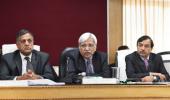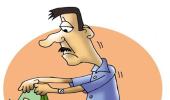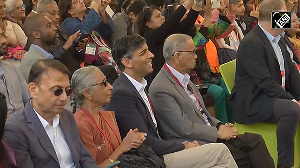Several candidates have a low level of literacy, but know just enough about social media to know it is important to have a presence there.
Neha Alawadhi reports.

The last Lok Sabha election -- in 2014 -- was perhaps the first poll in India where social media was extensively used as a tool by politicians, led mainly by Prime Minister Narendra Damodardas Modi.
Cut to 2019.
The number of voters using social media has only got bigger, but a look at the social media section of the affidavits filed by candidates this election shows that Indian politicians still have a long way to go to get tech-savvy.
A study of affidavits by the Indraprastha Institute of Information Technology, Delhi, and Hyderabad, as part of their ongoing research on social media usage and trends this election found some interesting examples.
'WhatsApp, Facebook, Instagram'. 'Twitter, Facebook.'
This is how some candidates declare their social media accounts to the Election Commission.
The EC requires candidates to fill out Form 26, which has information on their assets, liabilities, educational qualifications, criminal convictions and all pending cases and public dues, if any.
The affidavit has to be filed along with the nomination papers and the idea is for the voters to have a better idea of the candidates they would be voting for.
The first part of Form 26 has a section where the candidate has to provide their address, party name, contact information and social media accounts details.
A candidate from Hingoli, Maharashtra, mentioned the names of three banks he has accounts in under the section on social media accounts information.
Another candidate from South Delhi has provided the name of his party's Facebook page.
A candidate from Faridabad has mentioned her name separately for different platforms -- 'on Whatsapp', 'on Twitter', and 'on Massanger'.
When checked, no profile with her name was found on Facebook (WhatsApp and Messenger are chat applications).
One candidate from Rajasthan has mentioned as many as 14 Facebook pages under their social media details, while one from Gurugram has said 'N/A' (not applicable) thrice in the space provided, and has then given his full name, bank account number and IFSC code.
Several candidates have provided the e-mail id with which they are registered on Facebook, and the phone numbers on which they use WhatsApp.
"We started looking at affidavits as part of our attempt to know our candidates. Since I vote in Delhi, I looked at Delhi first and saw some interesting examples, and extended it to other states as well," says Ponnurangam Kumaraguru, professor at IIIT-Delhi and Hyderabad, who is leading this research.
"It is part of our larger election research to understand social media behaviour of candidates. Some candidates for example have verified social media accounts, some don't and some have following as low as ten or have tweeted or posted only twice or thrice."
The idea behind having a social media presence is often to reach a wider constituency of voters, but a cursory examination shows that several of the candidates mentioned above have as little as seven followers on Twitter, and often use their personal Facebook profiles to post about their political beliefs.
Part of the reason, according to a political commentator, is that several candidates have a low level of literacy, but know just enough about social media to know it is important to have a presence there.
Another reason why candidates are asked to disclose their social media presence is because the EC wants to be able to monitor their social media campaigns, which are now part of their campaign finances.
"A lot more scrutiny is required at the end of the Election Commission, especially by the returning officer accepting the affidavits," says Major General Anil Verma (retd), head of Association of Democratic Reforms, a non-profit organisation working for electoral reforms.
"We have often found several details such as gender, age, source of income to be incorrectly mentioned or with invalid entries in accepted affidavits as well," says General Verma.












 © 2025
© 2025